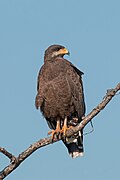Reconstruction:Proto-Turkic/kuš
Hello, you have come here looking for the meaning of the word Reconstruction:Proto-Turkic/kuš. In DICTIOUS you will not only get to know all the dictionary meanings for the word Reconstruction:Proto-Turkic/kuš, but we will also tell you about its etymology, its characteristics and you will know how to say Reconstruction:Proto-Turkic/kuš in singular and plural. Everything you need to know about the word Reconstruction:Proto-Turkic/kuš you have here. The definition of the word Reconstruction:Proto-Turkic/kuš will help you to be more precise and correct when speaking or writing your texts. Knowing the definition ofReconstruction:Proto-Turkic/kuš, as well as those of other words, enriches your vocabulary and provides you with more and better linguistic resources.
Proto-Turkic
Noun
*kuš
- (Common Turkic) bird
- (Siberian Turkic) duck
- Synonym: *ȫrdek
Declension
| singular | plural 2) | |
|---|---|---|
| nominative | *kuš | *kušlar |
| accusative | ||
| genitive | *kušnïŋ | *kušlarnïŋ |
| dative | *kuška | *kušlarka |
| locative | *kušta | *kušlarda |
| ablative | *kuštan | *kušlardan |
| instrumental 1) | *kušlarïn | |
| equative 1) | *kušča | *kušlarča |
1) The original instrumental and equative cases have fallen into disuse in many Common Turkic languages.
2) This plural suffix is used only on Common Turkic, and not in Oghur. See also the notes on the Proto-Turkic/Locative-ablative case and plurality page on Wikibooks.
2) This plural suffix is used only on Common Turkic, and not in Oghur. See also the notes on the Proto-Turkic/Locative-ablative case and plurality page on Wikibooks.
Descendants
- Arghu:
- Khalaj: quş
- Oghuz:
- Karluk:
- Kipchak:
- Siberian:
See also
| Animals in Turkic | |||||
|---|---|---|---|---|---|
 |
dog: *ï̄t |
 |
hunting dog: *eker |
 |
hen: *tiakïgu |
 |
lark: *torgay |
 |
dove, pigeon: *kȫkerčin |
 |
quail: *bïldurčïn |
 |
sparrow: *serče |  |
hawk, falcon: *kïrguy |
 |
goose: *kāŕ |
 |
wolf: *bȫrü |
 |
cow: *ingek |
 |
calf: *buŕagu |
 |
camel: *tebe |
 |
young of camel: *kȫĺek, *botu |
 |
horse: *at |
 |
foal: *kulun |
 |
worm: *kūrt |
 |
snake: *yï̄lan |
 |
fox: *tilkü |  |
goat: *keči |  |
he-goat: *teke |
 |
lion: *arsïlan |
 |
fish: *bālïk | carp bream: *čapak | |
 |
donkey: *eĺčgek |  |
carp: *siāŕgan |  |
catfish: *yāyïn |
 |
beaver: *kunduŕ |  |
hedgehog: *kirpi |  |
badger: *borsmuk |
 |
fly, mosquito: *siŋek |  |
wasp, bee: *ārï |  |
gadfly: *bȫgen |
 |
moth: *küńe |  |
louse: *bït |  |
earthworm: *sïbuĺgan |
 |
yak: *kotuz |  |
colt: *sïp |  |
dragon: *siāŕgan |
 |
worm: *kūrt |  |
deer: *keyik, *sïgun, *bulan, *bugu |  |
lizard: *keleŕ |
References
- Clauson, Gerard (1972) “kuš”, in An Etymological Dictionary of pre-thirteenth-century Turkish, Oxford: Clarendon Press, →ISBN, →OCLC, page 670
- Dybo, Anna Vladimirovna (2013). Этимологический словарь базисной лексики тюркских языков (in Russian), TOO - Prosper Print, pages 137-38.
- Räsänen, Martti (1969) “kuš”, in Versuch eines etymologischen Wörterbuchs der Türksprachen (in German), Helsinki: Suomalais-ugrilainen seura, page 305
- Starostin, Sergei, Dybo, Anna, Mudrak, Oleg (2003) Etymological dictionary of the Altaic languages (Handbuch der Orientalistik; VIII.8), Leiden, New York, Köln: E.J. Brill

